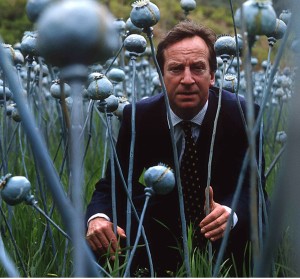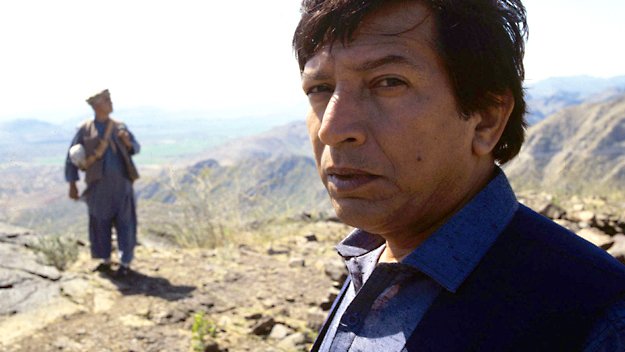I once saluted the Tinker, Tailor, Soldier, Spy mini-series as the summit of BBC programming. This week’s film recommendation is in the same league: 1989’s Traffik. Most Americans remember Steven Soderbergh’s Oscar-winning adaptation of this series, but far too few have seen the British original, which at just over 5 hours allows much more character and plot development than could Soderbergh’s fine movie.
Simon Moore’s masterful script anchors what could have been a sprawling, confusing series in the lives of a small number of characters: A UK Home Office drugs minister (Bill Paterson) whose daughter is a heroin addict (Julia Ormond), a dogged German cop (Fritz Müller-Scherz) who relentlessly pursues an ice queen (Lindsay Duncan) who steps into the drug trafficking business when her husband (George Kukura) is indicted, and a desperate Pakistani poppy farmer (Jamal Shah) who finds work with a ruthless drug lord (Talat Hussain). As events buffet the protagonists and their respective story arcs cross, Moore’s narrative skills and Alastair Reid’s deft direction ensure that the viewer is irresistibly drawn in emotionally and able to track the complexities of the plot.
The performances by the actors range from good to amazing. Though it is hard to choose some to single out for praise, Müller-Scherz completely inhabits his role as a working class police detective who seems to hate traffickers as much for their wealth as their drugs. Paterson is marvelous in a tragic role, playing a rigid man who desperately wants to do good at home and at work yet almost always fails in both domains. Lindsay Duncan is also impressive, beginning the film as a woman accustomed to wealth and knowing yet not wanting to know where the money comes from. After her husband’s arrest, Duncan makes credible her character’s transformation into someone even more cold-hearted than he, revealing the greed and entitlement that was lurking in her all along. Her character, along with Talat Hussain’s Pakistani drug lord, are used by the film to portray the drug trade much as socialists tend to see all of capitalist enterprise: A system with a few rich sociopaths on the top and countless marginal people (whether in the drug trade or addicted to its products) scraping by and suffering at the bottom.
The cinematic team behind Traffik took a somewhat subjective approach in their portrayal of drug production and daily life in Pakistan. Home Office minister Jack Lithgow (Paterson), improbably, roams around Pakistan unstaffed, not unlike Macbeth lost in the haunted forest. His encounters with the locals are more emblematic than realistic, including his somehow running into Fazal, the farmer who will be a hub of the story that unfolds. Coupled with dreamlike, sun dappled shots of the countryside by cinematographer Clive Tickner, the whole effect of the Pakistan sequences is akin to watching a surrealist play. Yet it works because Lithgow is on a mission of unreality, trying to stop drug production with a feeble crop substitution program and more generally trying to control a culture that he can barely even understand.
In contrast, the scenes set in Europe are more gritty and realistic, particularly Ormond’s descent into addiction. The skies are darker, the shadows longer and the cinematic look grimier. And over both the European and Pakistani scenes hangs Tim Souster’s music, a quasi-mystical threnody that accentuates the emotional anguish that the film creates. You won’t get his score out of your head quickly and you will not want to.
Traffik is a powerful, mournful film that doesn’t speechify or offer easy answers about drugs. Both artistically and as an education about its subject, it’s a triumph from start to finish.


I saw "Traffik" three or four years ago, and found it captivating. The development of the Lindsay Duncan character, by the writer, the director, and the actor, was pretty stunning, among the many remarkably fine elements of this miniseries. After reading your essay, I thought I would interrupt my re-viewing of the whole "The Wire" series (I've just watched the first episode of season 5), but neither Amazon nor Netflix has "Traffik" available for streaming, and I've become so used to instant gratification. Imagine having to wait two days to see something!
Your essay also called to mind another remarkably fine British miniseries, with many similarities to "Traffik": "State of Play", from 2003, which is similarly very well written, produced, and acted, and I could watch Bill Nighy in anything. Again, not available for streaming. I guess I'll just watch season 5, episode 2, of The Wire.
Nighy is truly a treasure. I just watched the Worricker trilogy that David Hare created around him. Although the series itself pulls off the unenviable trick of having each hour be a bit weaker than the hour before it, Nighy manages to carry the whole thing off anyway. He reminds me a bit of James Garner in the sense that he works very hard to make it appear that he isn't trying very hard, which can lead less discerning audiences to underestimate his acting ability.
The performer who makes it look easy is my ideal. Fred Astaire is the most obvious example, to me. As a dancer, of course. As an actor he seemed to try pretty hard to very little effect. As a singer, somewhere in between. I doubt if any opera singer can make it look really easy, but Juan Diego Flórez is probably as big a star as he is because he almost does (well, there's that voice, too). Frederic March in his later career settled into an easiness that makes him one of my favorite screen actors. And then there's Cary Grant, who fooled several generations into thinking he wasn't acting at all, probably doing himself out of several Oscars as a result.